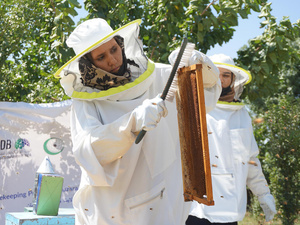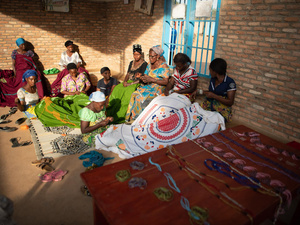UNHCR-backed programme helps women victims of war in South Kivu
UNHCR-backed programme helps women victims of war in South Kivu

A participant in one of the WWI courses receives a graduation certificate and tool.
UVIRA, Democratic Republic of the Congo, July 17 (UNHCR) - In a culture that marginalizes rape victims, Generose felt isolated socially, economically and psychologically from the society that failed to offer support in her need.
But once she found people who cared and made her feel safe again, both physically and emotionally, the 32-year-old Congolese woman began to rekindle her dreams of building a new life in South Kivu province after months of internal displacement in eastern Democratic Republic of the Congo (DRC).
Generose, who was brutally raped two years ago and saw her brother murdered, is one of around 2,400 women victims of conflict - many of them survivors of sex attacks - who have benefited in South Kivu from a UN refugee agency programme aimed at making them self-sufficient.
Run by UNHCR implementing partner Women for Women International (WWI), the programme provides courses aimed at helping returnee women - be they refugees or internally displaced - earn a living and become active members of society. It also aims to make local communities more sensitive about the impact of sexual and gender-based violence (SGBV) on uprooted women.
"These projects help returnees and other vulnerable women to improve their socio-economic and mental well-being," explained Jules Barhalegehwa Basimine, who heads WWI operations around the towns of Uvira and Baraka.
WWI conducts the programme at 13 training centres set up over the past two years in the main return areas in South Kava for refugees from Tanzania and Burundi, including Uvira and Baraka.
The women learn basic business and marketing skills that will benefit them and their community, while those who need it are taught literacy skills. "Once a woman learns to read and write in our programme, she can run her own business and her literacy skills will be passed on to her children," noted Nasir Fernandes, head of the UNHCR office in Uvira.
The women also discuss thorny issues such as SGBV while being taught about their rights. "Women actively participate in the training sessions," said Sharon Gschaider-Kassahun, UNHCR's specialist on SGBV in eastern DRC. "The classes on women's roles and the importance of becoming an active citizen are always lively," she added.
Annie, who fled to Tanzania after being gang-raped in 2002 at the height of the 1998-2003 civil war, is learning agricultural skills at the WWI training centre in Uvira. "Life is still hard, but I am trying to earn a living and provide for my family's basic needs," said the 40-year-old.
She echoed the thoughts of others taking part in the programme, which also helps former refugees utilize skills that they picked up in foreign camps but were never able to utilize. Generose said taking part in the programme had made "me dare hope of having a house, of living in peace, of reclaiming my dignity."
The WWI-implemented programme is particularly important because more than 70 percent of the people returning to the relatively stable South Kivu province are women and children. Projects that teach women job skills and boost female literacy should help kickstart the economy in an area lacking basic services and infrastructure after years of war.
"More investment should be added to income-generating projects, considering that we are in a transition phase from emergency to development," said Eusebe Hounsokou, UNHCR's Kinshasa-based regional representative.
"We are helping women not just to live but to be the breadwinners of their families, as reintegration is more sustainable through empowering women who take care of their families," added his colleague, Fernandes.
By Francesca Fontanini in Uvira, Democratic Republic of the Congo









